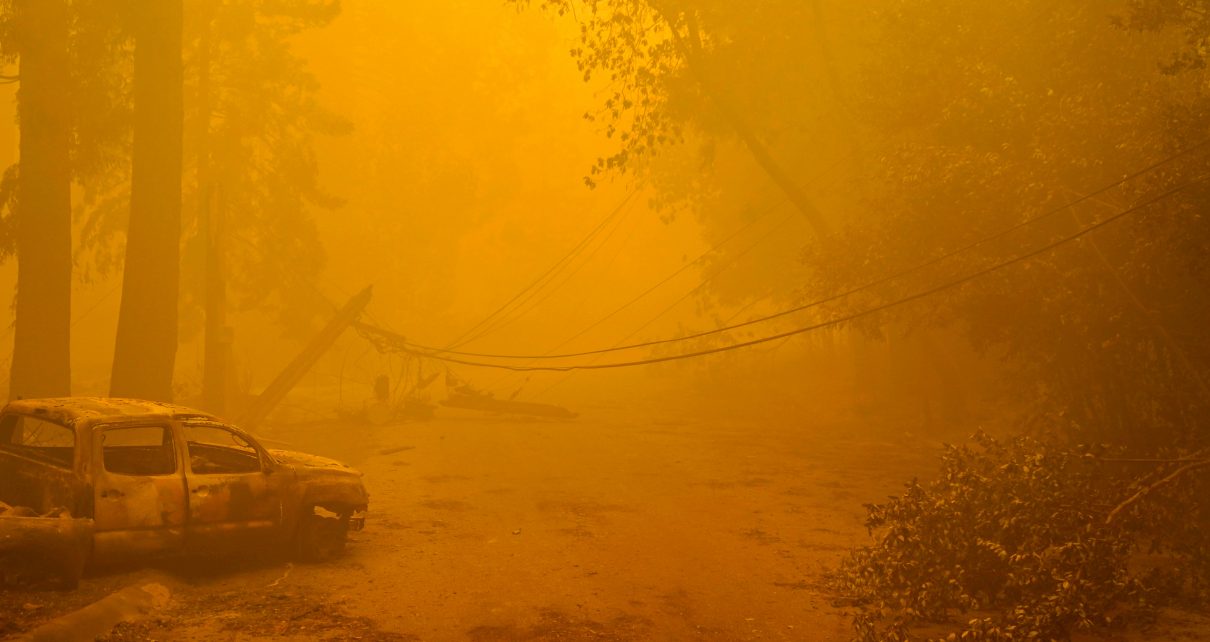So far 2020 has been a standout year for all the wrong reasons, including its devastating natural disasters. Wildfires have ravaged the western U.S., and tropical cyclones have popped up left and right, with several causing significant damage to coastal areas. The latest storm, Hurricane Delta, is headed for the Gulf Coast.
Though they are called natural disasters, the toll they take comes in part from human actions. The buildup of communities in vulnerable areas, such as along the coasts and fire-prone areas of the West, means more people are in harm’s way. Climate change, fueled by greenhouse gas emissions from energy use and industrial processes, has also upped the ante. Hotter weather dries out the grasses and forest debris that can ignite, fueling bigger and longer-lasting wildfires. And rising seas and heavier downpours mean higher flood risks during storms.
These factors have helped push some of this year’s disasters to surpass—and in some cases, shatter—previous records. This is a running list of all the ones that have been set this year.
Hurricanes
The 2020 Atlantic hurricane season has already been a doozy, and it does not even officially end until November 30. Here are some of the records it has already achieved:
- This is only the second time that the official alphabetical list of hurricane names has been used up, meaning forecasters have had to move to the supplementary list of Greek letter names.
- If three more storms form, 2020 will tie 2005 as the season with the most named storms on record: 28. (Named storms are those that reach at least tropical storm strength, with winds of 39 to 73 miles per hour.) If four more form, this year will set a new record.
- Twenty-two of the 25 storms that formed so far this season were the earliest of their storm number to do so. For example, Delta was the earliest 25th named storm of any season, beating out Tropical Storm Gamma, which formed on November 15, 2005.
- If Hurricane Delta makes landfall as expected, it will be the first time 10 named storms have hit the U.S. in a single season.
- A Delta landfall will also be the first time a Greek alphabet named hurricane has made landfall in the U.S.
- September, which falls within the peak of the hurricane season, saw a record 10 named storms form within the month. (The previous record was eight.)
- In mid-September, there were five storms churning around the Atlantic Ocean simultaneously for only the second time on record.
- September 18 marked the second time on record that three named storms—Wilfred, Alpha and Beta—all formed on the same day. The only other time this was known to happen was on August 15, 1893, before hurricanes received official alphabetical names.
(The Atlantic hurricane database, managed by the National Hurricane Center, extends back to 1851. The lists of alternating male and female hurricane names have been in use since 1979.)
Wildfires
Wildfires have taken an enormous toll on western U.S. communities, both from flames and harmful smoke. California has borne the worst of it. Here are some of the records that have been set:
- Fires have so far burned more than four million acres across California, about doubling the previous record of nearly two million acres set in 2018. Quality records of fires size in California go back to 1932.
- The August Complex Fire alone has burned more than one million acres, by far the largest in California’s history. The previous record of more than 459,000 acres was set in 2018 by the Mendocino Complex Fire.
- Five of California’s six largest fires are burning this year.
- Colorado’s Pine Gulch Fire was the largest in state history, burning more than 139,000 acres.
Rain and Flooding
Heavy rain sent water levels in the Tittabawassee River to record highs in May, causing the failures of the Edenville and Sanford dams near Midland, Mich. Some 10,000 residents had to evacuate because of the subsequent floods.
Overall
So far this year, the U.S. has had 16 natural disasters (including wildfires, hurricanes, tornadoes and drought) that each caused at least $1 billion in damage, tying the record set in both 2011 and 2017—with several months left to go. Such statistics have been compiled since 1980.

